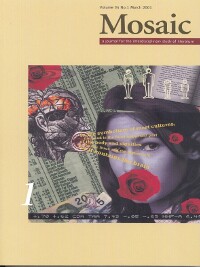Issue 34.1
Overview

General Issue
Published: March 2001
View the issue introduction or see the issue summary and contents below.
11 essays, totalling 192 pages
$15.00 CAD
This general issue of Mosaic contains diverse essays loosely arranged around representation, psychology, identity, and various kinds of economy. The essays reconsider aspects of the Oedipal myth, Lacanian rhetoric, Shakespearian economies, and Holocaust representation. Other essays examine texts like “The Panther Captivity,” Their Eyes Were Watching God, “A Vale of Tears,” and the novels of Richard Brautigan.
The Pleasure of Being Lost: “The Panther Captivity” and the Metaphysics of CommerceAmy Pratt This essay examines, critically, the way a popular post-revolutionary captivity narrative, “The Panther Captivity” challenges a model of self influenced by economic ideas about self-regulating natural laws. | |
The Logic of Expenditure in Their Eyes Were Watching GodThomas F. Haddox Zora Neale Hurston’s Their Eyes Were Watching God has sometimes been criticized for its alleged failure to critique racism and sexism and for its emphasis on self-affirmation. This essay uses Georges Bataille’s notion of expenditure to illuminate the novel’s treatment of the interlocking conflicts of race, class, gender, and religion. | |
Fluid Economies: Portraying Shakespeare’s HystericsKaara L. Peterson Rather than adopting the psychoanalytic construct of “hysteria”, this essay examines how hysterical pathology is defined according to early modern medical and cultural contexts and how it is represented in Shakespeare’s plays. Looking at nineteenth-century paintings as metaphors, the essay renders visible the Shakespearean hysteric lost to history. | |
Between Sublimity and Redemption: Toward a Theory of Holocaust RepresentationMichael Bernard-Donals The terms sublimity and redemption are controversial in the context of the Holocaust. This essay re-examines these terms in their relation to theology and Kantian aesthetics, and works from the terms to a theory of Holocaust representation. | |
Brautigan’s PsychomachiaKathryn Hume Critics have interpreted Brautigan as experimentalist, hippie/beat, and neurotic. The author of this essay constructs him as narrative aesthetician, whose Zen-based strategies let him balance extreme emotional tensions with simple form and encourage an unusual kind of reader response. | |
On the Return of (the Repressed): RhetoricE.F. Dyck Using a Freudian metaphor reinterpreted by Jacques Lacan, this essay argues that rhetoric is returning to the humanities. That return manifests itself in partial returns through topoi, truncated returns via the figure, fuller returns in feminist criticism, and in varying degrees of success, but always with the playful seriousness that is rhetoric’s trademark. | |
Southwell’s “A Vale of Tears”: A Psychoanalysis of FormGary Kuchar Putting psychoanalytic conceptions of self-transformation through speech in dialogue with early modern devotional techniques of spiritualizing the physical, this essay asks how Robert Southwell’s poem “A Vale of Tears” constitutes a work of mourning. | |
New Science, Old Myth: An Evolutionary Critique of the Oedipal ParadigmMichelle Scalise Sugiyama Arguing that literary scholarship remains largely oblivious to important late-twentieth-century scientific advances in human cognition and behaviour, this essay reviews biological and anthropological evidence contradicting the oedipal model, and presents an evolution-based analysis of the Oedipus myth. | |
Gambling against the House: Anglo and Indian Perspectives on Gambling in American LiteraturePaul Pasquaretta Arguing that the controversy over reservation gambling reflects unresolved tensions involving Indian relations and the social role of gambling in American culture, this essay analyzes gambling in two early-twentieth-century novels, Edith Wharton’s The House of Mirth and Mourning Dove’s Cogewea, the Half-Blood. | |
Whose Story Is It, Anyway? An Interdisciplinary Approach to Postmodernism, Narrative, and TherapyHerb Wyile and David Paré This essay examines the increasing influence of postmodern thinking in literary studies and psychology. It explores, both theoretically and through case studies from both fields, the increasing convergence between the two discourses. | |
The Realist Trickster as Legba: Howells’s Capitalist CritiqueSämi Ludwig This essay posits a trickster figure as the central element of William Dean Howells’s critique of capitalism, in which the market system divides into aspects of unformed power, on the one hand, and applied competence, on the other. It argues that these dual elements of raw force and guiding structure are found in traditional trickster mythology. |